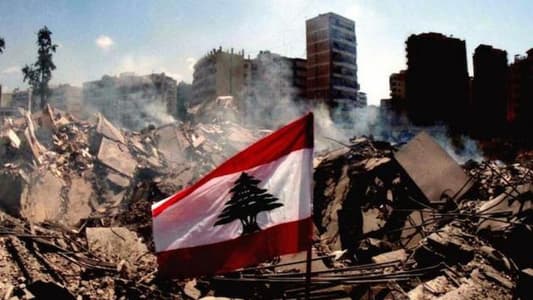What is it like to witness the total collapse of your country?
It's like being forcibly seated on an uncontrollable roller coaster. You scream, terrified; you call for help, hold your breath, pray for a miracle that would never come. You finally give in and wait to hit rock bottom. But the freefall never ends.
That's Lebanon, nowadays.
Two years ago though, a wind of change and freedom was sweeping through the country.
In October 2019, mass protests erupted, in which many saw a glimpse of hope: an uprising aimed to fearlessly topple one of the wickedest and most corrupt regimes. At a key historic moment in Lebanon, all sectarian and political taboos imposed by the ruling class would gradually fall in a domino effect. Different factions of the population were in fusion, chanting - like never before - slogans against the mafia lords who have been robbing them for decades. People finally felt empowered. But this jubilation didn't last long. Peaceful protesters were faced with crackdowns and schemed plans that succeeded in reviving divisions. Traditional political parties resorted to violence and intimidation to tighten their grip on society and strangle the opposition.
Meanwhile, the Lebanese pound had crashed amid an unprecedented financial meltdown. People could no longer withdraw their money from banks and were suddenly deprived of their life savings, in the most atrocious way.
In 2020, the pandemic crippled the country even more; catastrophic events alternated in crescendo.
The negligence and incompetence of Machiavellian Lebanese officials killed at least 219 victims and injured thousands of people in one of the biggest non-nuclear explosions in the world. On August 4, 2020, Beirut was destroyed and the lives of many were forever shattered. There was an interminable grief, but also a growing anger. A lot of it.
Apocalyptic scenes from that day still haunt us. The brokenness that ravaged our hearts, the sight of victims covered with blood amidst piles of rubble, the weeping faces of people mourning their loved ones, all of that will remain engraved in our collective memory.
Yet more than one year later, no one has been held accountable. Local authorities who knew about the ammonium nitrate, didn't blink an eye. They kept the country in a political gridlock for 13 months, unremorsefully failing to form a government, until recently. And they even tried to obstruct justice by suspending the work of the lead investigator Judge Tarek Bitar, a decision that outraged families of the victims.
After the devastating blast that changed the face of our capital city, there was no end to our ordeals; only an end to our chances in restoring our lives.
While prices kept skyrocketing, the dire living conditions worsened. Almost three-quarters of the population couldn't afford anymore to buy food and basic needs. Salaries lost 90% of their value due to hyperinflation.
Suddenly people had to start worrying about fuel oil and gasoline shortages, and get accustomed to long hours of power cuts and never-ending queues in front of gas stations.
In an extremely stressful situation, every household had to adapt to blackouts and energy rationing schedules.
Eventually, many factories, businesses and sectors had to shut down. Bakeries would soon be unable to function, creating another round of humiliating queuing, this time for bread.
But the worst was yet to come.
Hospitals ran out of medical supplies and vital drugs. Patients with chronic diseases such as cancer and kidney failure no longer have access to life saving treatments. It's like sentencing them to death.
Lebanon is also facing a lack of essential medicines, including antibiotics and children's vaccines. It's even impossible to find any medication to soothe symptoms of food poisoning while there's an outbreak caused by unrefrigerated food due to power outages.
In fact, every day there's a new staggering norm in Lebanon, and it just leaves everyone mentally and physically depleted, struggling for mere survival.
One of the latest catastrophes was a deadly explosion in Northern Lebanon, in a warehouse where gasoline was illegally stored.
How can any country rise again after such traumatizing events that no human being should endure?
Many lost hope in a better future. That's why we're witnessing the mass exodus of skilled workers, doctors, teachers, talents and middle-class citizens. With this brain drain, Lebanon is losing its best asset.
As for those who cannot afford to leave, they are being held hostages, plunged into despair in an immeasurable way. Resilience and the myth of the phoenix reborn from ashes are too heavy a burden.
The insatiable greed of Lebanese politicians led the country to hell and impoverished the population. After a missed revolution, breaking this vicious cycle seems almost impossible, though some may bet on the upcoming parliamentary elections, and others on the international community. But political leaders who brought the country to its demise, are still in power, and their partisans bond with them, like a Stockholm syndrome effect.
Any prospect of recovery would undeniably take time. While living here has been meanwhile reduced to surviving cumulative disaster exposure, will Lebanon beat the odds and find its way to a drastic political change?






TWEET YOUR COMMENT